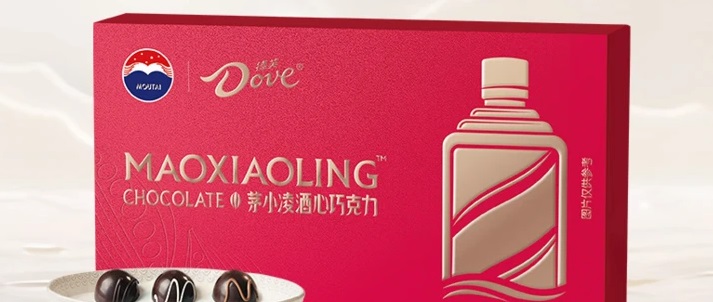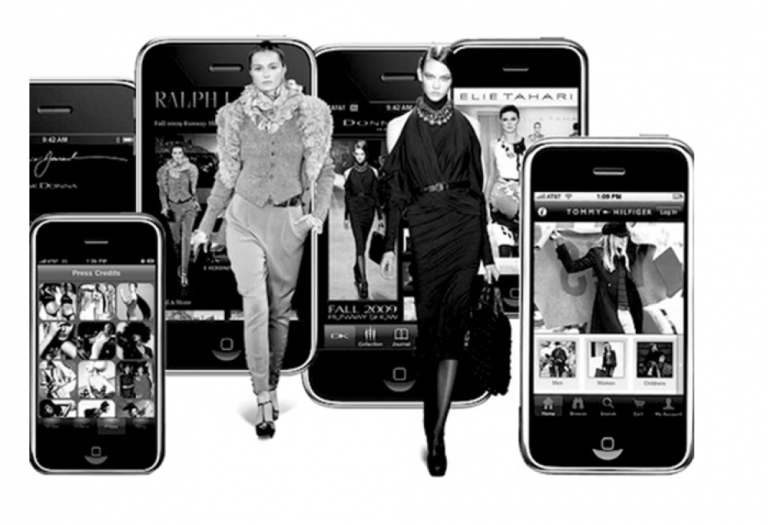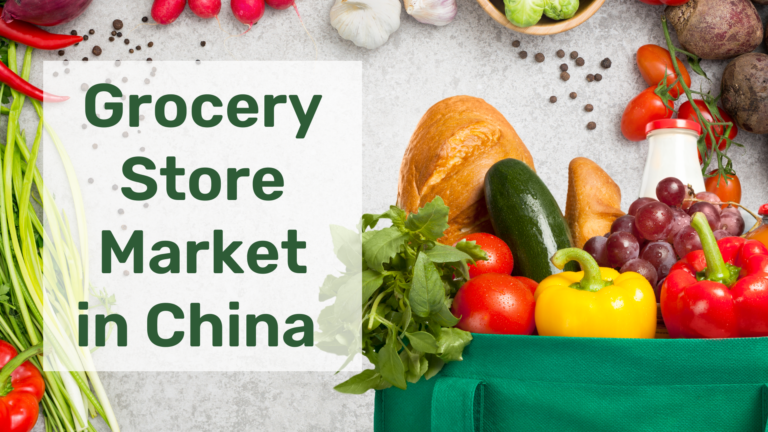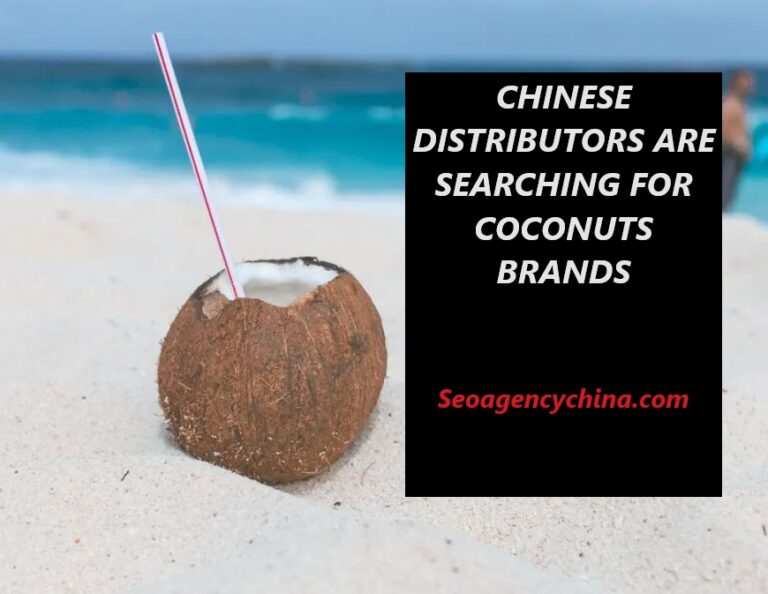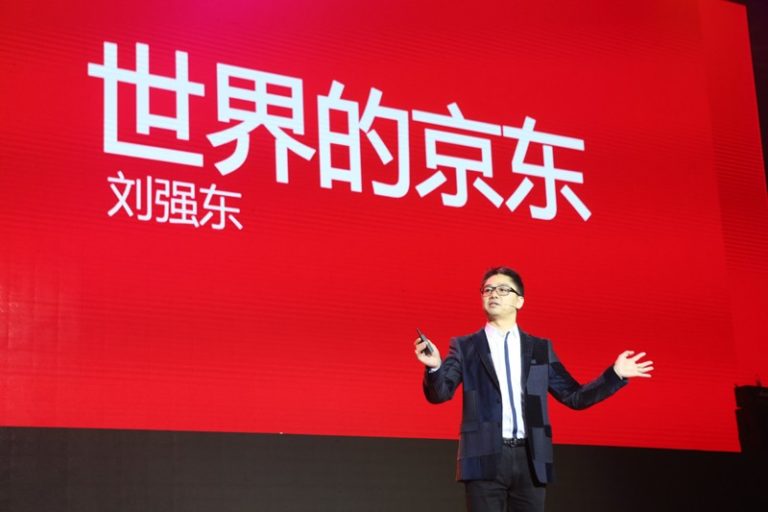In China, Luxury Brands bet on Food and Coffee Shops
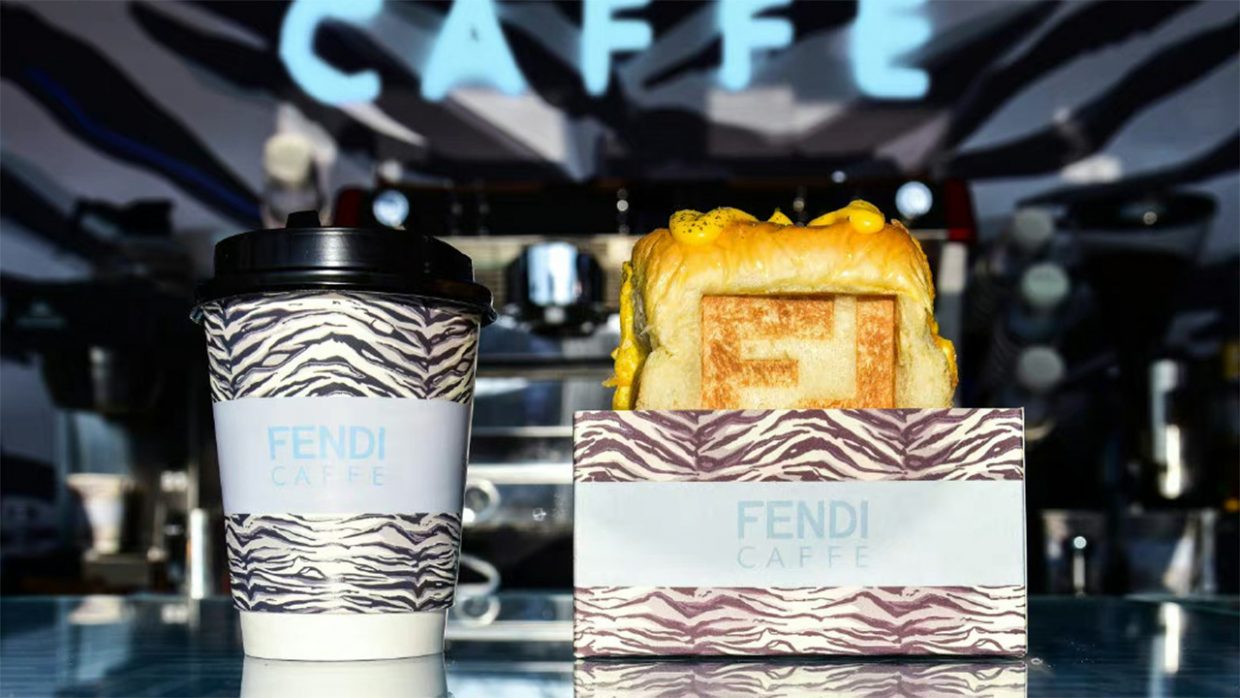
In China , most Italian luxury Brands create marketing operation with Food and Coffee. Very popular these year that Top luxury Brands associate with food brand or open their Coffee shop, restaurant…
Cost-Effective Agency
KPI and Results focused. We are the most visible Marketing Agency for China. Not because of huge spending but because of our SMART Strategies. Let us help you with: E-Commerce, Search Engine Optimization, Advertising, Weibo, WeChat, WeChat Store & PR.
Branding is everything in China, once you have it … EVERYTHING IS POSSIBLE
SeoAgencyChina Overview
- Luxury brands in China, are diversifying their portfolios into areas like hotels and interior design.
- The Armani Group has significant plans for expansion in China, with ventures like the Armani Art Residence and a residential project in Beijing.
- Bulgari is keenly expanding its hotel brand, marking its presence in popular destinations like Bali and cities such as Beijing and Shanghai.
- Macau has emerged as a hotspot for luxury hotel projects, with big names like Karl Lagerfeld and Versace entering the market.
- Brands traditionally rooted in fashion and leather goods must ensure that their expansion into new domains matches their established reputation in terms of quality.
- Collaborations between luxury brands and experts, like the partnership of Chanel with renowned chef Ducasse, can uphold the brand’s image in these new ventures.
- A consistent quality experience across all brand extensions is crucial to ensure long-term success and reputation.
- Targeted marketing, such as Bulgari hosting high-profile events, can effectively attract the desired clientele and create buzz around new ventures.
- Brands must be cautious, as a decline in service or product quality in one domain can impact their overall brand image.
- As luxury brands continue to explore diverse ventures, partnerships with experts in the respective fields can be a strategic move to ensure excellence and positive brand
Valentino’s Sweet Strategy in China
Valentino is putting a delectable spin on promoting its signature Pink PP color. In a delightful collaboration, the fashion house has teamed up with Cova, one of Italy’s most venerable pastry establishments under the LVMH umbrella. The result is an exclusive Pink PP-themed afternoon tea set, available from July 27 to August 27 at the Cova outlet in Shanghai’s Plaza 66. Notably, this is the very location of Valentino’s newly inaugurated boutique.
With Chinese Valentine’s Day on the horizon, Valentino has expanded its gourmet reach. Partnering with Italian luxury chocolate maker Venchi, they’ve introduced a Pink PP-themed pitaya gelato. This treat can be found at Venchi’s 43 outlets across China from August 4 to early September.
Buzz in China
The promotional hashtag for the Valentino and Venchi partnership, labeled “Sweet V Collab,” has amassed over 162,000 views on Weibo. Fueled by the recent enthusiasm for the Barbie movie, the Pink PP hue from Valentino has further cemented its place in the hearts of local fans. The combined efforts of these collaborations have significantly boosted organic engagement on Chinese digital platforms.
Valentino’s move to offer the Pink PP-themed afternoon tea set exclusively at Cova’s Plaza 66 location in Shanghai is noteworthy.
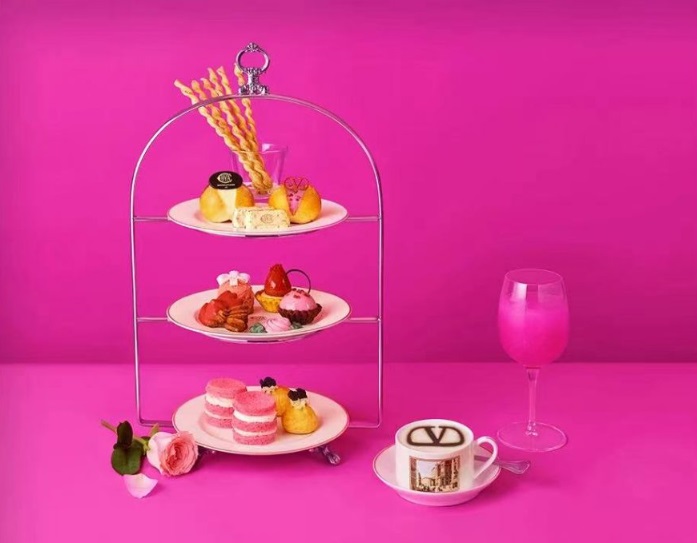
Platforms like Xiaohongshu have been pivotal in highlighting local eateries, mirroring the global trend set by Instagram which has made food photography a much-celebrated online content genre. According to a survey by McKinsey’s ConsumerWise insights team conducted in May, dining establishments are at the top of the list for Chinese consumer spending. These spots are now pivotal platforms for consumers to express their lifestyles and values.
Strategic CoBranding
While Valentino isn’t the inaugural luxury brand to ally with food and beverage companies, it certainly stands out in its execution. Many luxury brands often gravitate towards popular tea and coffee chains like Heytea and Manner for generating online traction. But the widespread appeal of such partnerships doesn’t always equate to an expanded luxury clientele.
In the case of Valentino, aligning with brands like Cova and Venchi is a strategic move. Both have deep-rooted Italian heritages and epitomize the nation’s gourmet finesse. Their offerings, although reflective of luxury, are more approachable price-wise when juxtaposed with upscale dining. Through these partnerships, Valentino not only reinforces its cultural significance but also successfully appeals to a broader consumer base with innovative offerings.
Gucci the Restaurant in Shanghai
Gucci, the renowned luxury brand, is broadening its horizons in China by launching a signature restaurant in Shanghai. This endeavor marks the iconic Italian brand’s maiden foray into the culinary space.
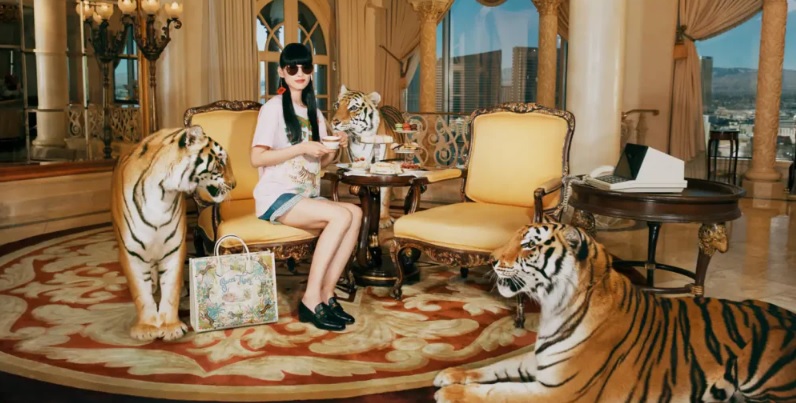
Dubbed “1921Gucci” in homage to the founding year of the brand by Guccio Gucci, the restaurant has been welcoming diners since July, nestled within Shanghai’s iAPM shopping center.
The establishment, spanning a spacious 600 m², is under the stewardship of the Italian executive, Alessandro Sandomenico. It promises patrons an immersive experience reminiscent of the Tuscan landscape.
This move aligns with Gucci’s concerted efforts to amplify its footprint in China, a pivotal market for the luxury domain. The brand, in its commitment to the Chinese consumer, has also slashed prices for some flagship products by up to 50% in its local stores this year.
Gucci’s culinary venture echoes a rising trend among fashion moguls. Many are diversifying by introducing gastronomic venues in prestigious locales: Cannes boasts the Armani Caffé, Seoul is home to a Hermès restaurant, and New York proudly hosts the Ralph Lauren Polo Bar.
While “1921Gucci” stands as Gucci’s debut in the restaurant sector, it’s noteworthy that the brand also oversees the food court within its museum in Florence.
Fendi in China
Luxury brand Fendi has been making waves on Chinese social platforms, catching the eye of consumers with its inaugural partnership with the popular Chinese drink brand, Heytea. This collaboration was rolled out to herald the opening of Fendi’s roving “Hand in Hand” exhibition in Beijing.
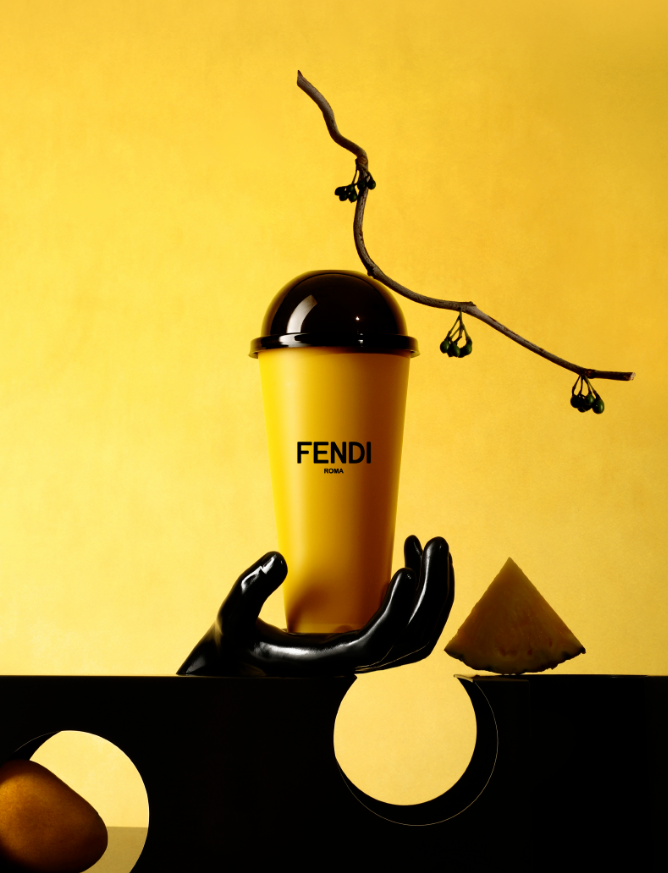
The launch on May 17 saw the Fendi x Heytea collaboration fly off the shelves, marking a resounding success for both entities. Social media platforms like Weibo and Xiaohongshu are flooded with snapshots of enthusiasts showcasing the eye-catching passion fruit and mango drink in the limited edition cups. The dedicated hashtag #喜茶fendi联名# has drawn an impressive viewership of 32.6 million on Weibo alone, accumulating over 8,662 organic posts to date.
In line with the promotional campaign for the specially crafted drink and its accompanying vibrant yellow and black accessories, Fendi and Heytea have set up an exclusive Hutong Tea Room experience in Beijing. Spanning May 19 to June 16, visitors can unwind in a luxurious lounge adorned in the collaboration’s distinct hues, located at the historic Temple Dongjingyuan. This venue also plays host to the aforementioned exhibition.
Fendi’s “Hand in Hand” exhibition, currently in Beijing, has previously graced cities like Rome and Tokyo. This unique showcase spotlights a variety of innovative renditions of Fendi’s iconic Baguette bag, masterfully reimagined by local artisans.
Moutai Coffee
The collaboration between Luckin and Moutai clearly was crazy
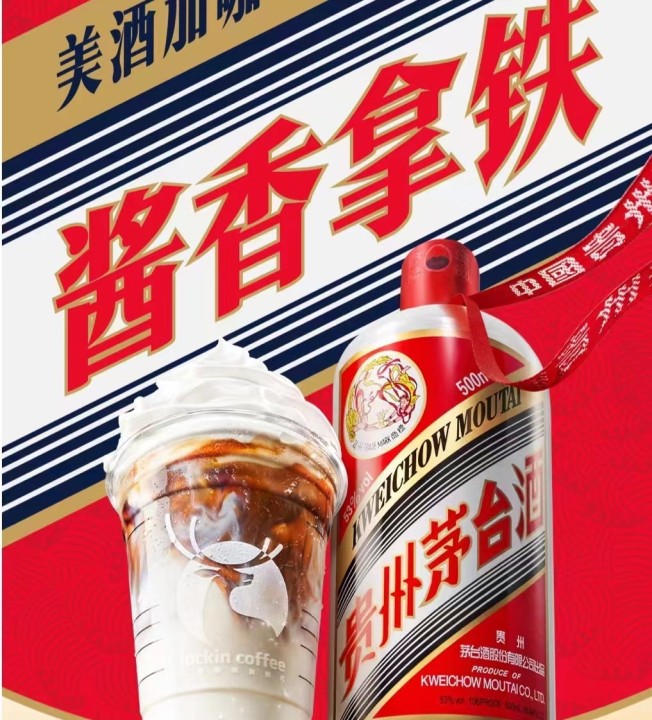
The beverage, resulting from a partnership with the famed Chinese liquor brand Kweichow Moutai, raked in over 100 million yuan (US$14 million) on its debut day source
Interesting trends
In China and across Asia, luxury brands are diversifying into the realms of hotels and interior design. As a case in point, Armani Group is set to unveil its 65-story Armani Art Residence in Chengdu in 2016 and has undertaken the interior design of a residential project by Ma Yansong in Beijing’s Central Business District, slated for completion by the end of 2017. Likewise, Bulgari is scaling up its hotel ventures, having promoted its Bali property to Chinese tourists through high-profile events like celebrity weddings. In 2017, they’re slated to inaugurate hotels in both Beijing and Shanghai. Macau, with its appeal, has seen luxury brands like Karl Lagerfeld and Versace conceptualize and develop extravagant hotel properties.
SeoAgencyChina analysis for brands historically known for fashion or leather goods, it’s imperative to ensure their new endeavors uphold the brand’s reputation. A misstep or drop in quality can tarnish their legacy. Thus, to ensure a seamless alignment between their primary offerings and new ventures, collaborations with experts, such as Chanel partnering with acclaimed chef Ducasse, are astute strategies. By integrating top-tier professionals, brands can ensure a consistent quality experience, leaving no room for negative impressions.
Read more

